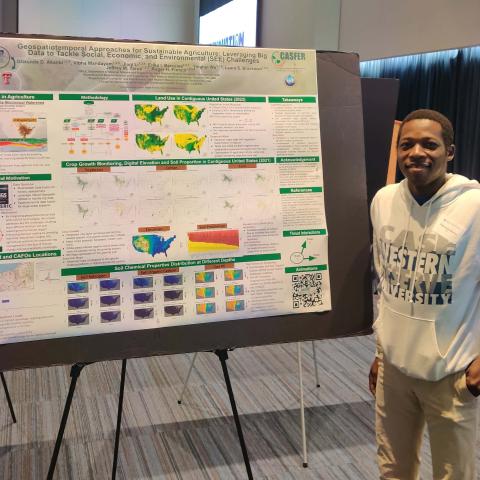Case School of Engineering PhD candidate Olatunde Akanbi’s agricultural and geospatial research synthesis involves so much data that a regular computer would crash trying to process it. Monitoring crop health and soil nutrient flows requires aggregating massive datasets, including satellite imagery and U.S. Geological Survey sensor data, requiring far more computing power. After earning a Freedman Fellowship for his research, Akanbi worked with digital scholarship experts at Kelvin Smith Library to integrate geospatiotemporal data modeling using the center's computers to enhance precision agriculture and help farmers manage crops more sustainably.
Akanbi, who earned his master’s degree in Material Science and Engineering from Case Western Reserve, says more than 80% of fertilizers used in agriculture are washed away, polluting bodies of water and harming aquatic life. As farmers face a demand to produce more crops faster, many rely on fertilizers—but improper use can lead to inefficiencies and environmental degradation.
“We can’t stop using fertilizers,” said Akanbi. “But, what my work is looking at is, can we help monitor crop health to enhance fertilizer use and reuse the waste that contains a lot of those nutrients that were not absorbed?”
Akanbi, who has a bachelor’s degree in computer science and engineering, says his biggest hurdle was integrating historical data, satellite images and pollution measurements.
“For example, the United States Geological Survey has sensors in rivers and lakes that provide information on the amount of pollutants in the water every 15 minutes at stations all across the U.S. That is a lot of data to pull in,” said Akanbi. “The Freedman Center’s team introduced me to GIS software that helped me integrate the data for Ohio and make nutrient predictions.”
Akanbi encourages other students and faculty to apply for Freedman Fellowships and says the experience exposed him to GIS software he never used or explored before.
“The Freedman Center opens new pathways for academic exploration and dissemination,” said R. Benjamin Gorham, PhD, research data and GIS specialist, Digital Scholarship Team at Kelvin Smith Library, who served as Akanbi’s liaison for the fellowship. “Digital scholarship enables researchers across disciplines to explore new tools, workflows and methodologies—leading to fresh insights and even new research questions.”
Akanbi’s research has already earned accolades, including first-place honors at the National Science Foundation’s Center for Advancing Sustainable and Distributed Fertilizer Production Annual Symposium. His work also earned the best three-page poster paper award among 119 submissions at the Institute of Electrical and Electronics Engineers (IEEE) Big Data Conference 2024 in Washington, DC. He hopes his research will help farmers think outside the box to address critical challenges in modern agriculture by leveraging cutting-edge geospatial techniques, contributing to both agricultural productivity and environmental health.
In his free time, Akanbi spends time with his wife (a fellow Case Western Reserve PhD candidate) and his 4-year-old. Akanbi acknowledges the invaluable support of his advisors, colleagues and mentors at the Solar Durability and Lifetime Extension (SDLE) Research Center. He says their guidance and collaboration have been instrumental in shaping his research and driving innovation in sustainable agriculture. The certified AWS solution architect also volunteers with the Deeper Christian Life Ministry.
The Freedman Center for Digital Scholarship at Kelvin Smith Library supports advancing digital scholarship research projects from Case Western Reserve University faculty and students. The annual fellowships aid faculty and student researchers in integrating digital tools and technology into their work across multiple disciplines to support learning and advance scholastic discoveries.
The 2024-25 Freedman Faculty Fellows program was generously funded by the Freedman Fellows Endowment, established by Samuel B. and Marian K. Freedman.


